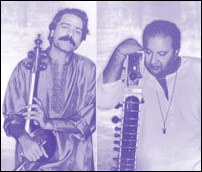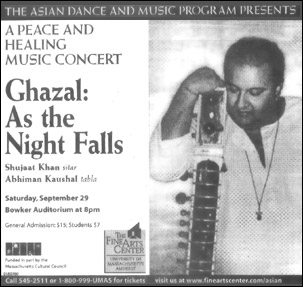|
Concert Review by Lou Wigdor Visa Trouble West of
the Silk Road |
 My
wife and I were upbeat after securing a sitter three nights before a
September 29 concert at UMass, featuring the Iranian/Indian duo,
Ghazal (photo left). We had looked forward to the concert for weeks, but our mood
turned to puzzlement when minutes later, I opened the Gazette
to find an ominous display ad for the event. Instead of the customary
head-to-head shot of the duo, the ad was dominated by the substantial
presence of Ghazal’s Indian half, Shujaat Khan
(photo
at bottom). Nowhere to be found
was Khan’s Persian musical alter ego, Kayhan Kalhor. Kalhor, who
plays the kamancheh, an ancestral and distant relative of the violin,
is arguably among the world’s premier string players/improvisers.
(For evidence listen to Ghazal’s three albums on Shanachie or Kalhor’s
own cd, Gathering Stars Like Dust on Traditional Crossroads.) My
wife and I were upbeat after securing a sitter three nights before a
September 29 concert at UMass, featuring the Iranian/Indian duo,
Ghazal (photo left). We had looked forward to the concert for weeks, but our mood
turned to puzzlement when minutes later, I opened the Gazette
to find an ominous display ad for the event. Instead of the customary
head-to-head shot of the duo, the ad was dominated by the substantial
presence of Ghazal’s Indian half, Shujaat Khan
(photo
at bottom). Nowhere to be found
was Khan’s Persian musical alter ego, Kayhan Kalhor. Kalhor, who
plays the kamancheh, an ancestral and distant relative of the violin,
is arguably among the world’s premier string players/improvisers.
(For evidence listen to Ghazal’s three albums on Shanachie or Kalhor’s
own cd, Gathering Stars Like Dust on Traditional Crossroads.)
A call to the Fine Arts Center box office confirmed my suspicions. Kalhor would neither be on the program nor in the zip code. The reason: in the post-September 11 cosmos, he had encountered “visa problems.” That Kalhor was no stranger to American audiences didn’t matter a quaver. In the spring of 2000, he had given a series of recitals in over a dozen American cities, with tarist Hossein Alizadeh and Iran’s greatest singer, Shajarian. Kalhor has also established his credentials in the West as a composer. The Kronos Quartet has recorded one of his compositions on its recent CD, Caravan. And Yo-Yo Ma’s Silk Road project is performing a composition by Kalhor featuring -- what else? -- kamancheh and cello. So what happened at the concert? Sujaat Khan, who teaches at UCLA and is the son and celebrated protégé of India’s second most famous sitarist, Vilyat Khan, brilliantly performed several ragas with a tabla player--the latter himself a last-minute replacement for the original tabla player, who had remained in India with -- you guessed it -- visa issues. It was masterful; but it wasn’t the special synthesis that has distinguished Ghazal. To evoke the Ghazalian spirit, Khan spoke to the audience about links between classical Persian and Northern Indian music-including shared scalar modes, rhythms, and improvisational objectives. As a coda to the concert, he sang a devotional Sufi hymn in Persian. Earlier in the evening, UMass Asian
Dance & Music director Ranjanaa Devi and emeritus music professor
Fred Tillis added constructive light to the proceedings. Both
emphasized the importance of music and the arts in transcending
political and geographical boundaries. Devi informed the audience
about K |
 alhor’s
visa complications and about the uncertain climate
affecting many Asian artists traveling to the United States. The
post-September 11 world has not been easy for them or for Devi’s
program. The week after the terrorist bombings in New York and
Washington, Devi cancelled a Middle Eastern cultural lecture. In early
October, a Japanese puppet theatre performed a full evening concert
but not its scheduled outreach programs, because of limitations
associated with visa restrictions from the Japanese government. And
the Ghazal concert itself drew only 250 people-in part due to Kalhor’s
absence, but also because of fear among some Asians in the local
community to attend. “It many be hard for many Americans to fathom,
but some Asians in this community were afraid to come out of their
homes for an Asian concert so soon after September 11th,”
Devi told this writer. “But this series will go on in spite of the
prevailing climate. It is vitally important that we support arts that
celebrate our cultural differences while at the same time revealing
our shared humanitarian values.”
alhor’s
visa complications and about the uncertain climate
affecting many Asian artists traveling to the United States. The
post-September 11 world has not been easy for them or for Devi’s
program. The week after the terrorist bombings in New York and
Washington, Devi cancelled a Middle Eastern cultural lecture. In early
October, a Japanese puppet theatre performed a full evening concert
but not its scheduled outreach programs, because of limitations
associated with visa restrictions from the Japanese government. And
the Ghazal concert itself drew only 250 people-in part due to Kalhor’s
absence, but also because of fear among some Asians in the local
community to attend. “It many be hard for many Americans to fathom,
but some Asians in this community were afraid to come out of their
homes for an Asian concert so soon after September 11th,”
Devi told this writer. “But this series will go on in spite of the
prevailing climate. It is vitally important that we support arts that
celebrate our cultural differences while at the same time revealing
our shared humanitarian values.”